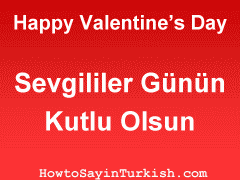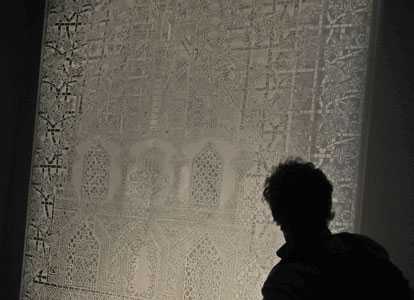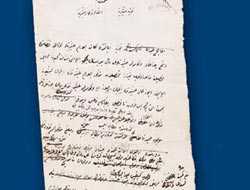James Tressler
 “Sevgililer günümüz kutlu olsun!” Or Happy Valentine’s Day” in Turkish.
“Sevgililer günümüz kutlu olsun!” Or Happy Valentine’s Day” in Turkish.
One wouldn’t immediately associate Valentine’s Day with the Turks, since it is generally viewed it as a Western holiday. But Lover’s Day, as the Turks call it, has been popular here for many years.
As with Christmas season, when the streets of Istanbul sparkle with garlands of colored lights, Turks are captivated by the shiny accoutrements of Valentine’s Day – flowers, boxes of candy, candlelit dinners . Also, Turks are very passionate people, and a rose delivered to the office of a pretty young woman is guaranteed to elicit a proud, happy smile from the recipient — not to mention misery and jealousy from all over her single co-workers. A woman wearing her sevgi’s gift also provides a subtle hint that would-be Romeos need to save their balcony speeches for someone else.
On Thursday, as my driver Çetin was taking me to an in-company lesson on the outskirts of Istanbul, our attention was caught by the sight of Romany gypsies weaving in and out of the mid-morning traffic. That in itself was nothing unusual – for the majority of the city’s gypsy population earn their daily bread in the streets.
It’s a hard keep, for sure. As in Europe, gypsies here are generally very poor. In summer, when Istanbul is dizzy with torpid heat and humidity, the gypsies are out at the busy intersections hawking bottled water to drivers stuck in traffic. At Christmas time, with snow falling on the city, you will see them with handfuls of fresh holly gathered from who knows where. When sudden heavy rains arrive in spring, the gypsies will magically appear at the metro stops and street corners selling plastic umbrellas at one lira apiece.
What made seeing them this past Thursday morning exceptional was the fact that the ever-opportunistic and resourceful gypsies, including men, the women in their colorful headscarves, and even children, were now out selling bundles of roses. As always, one had to admire their timing.
Çetin and I watched as one of the gypsy women approached a car that was waiting at the red light. She waved the bundle of roses under the driver’s surly nose. The driver, a businessman, rolled up the window and brusquely waved the poor woman off.
Çetin laughed. “He’s an angry man,” he said, in Turkish. “He’s angry because he doesn’t have a girl to give flowers to.”
The woman went on to the next car. The light changed, and we continued on our way, passing more of the gypsies, watching one of the women score a sale to a family in a sedan.
I asked Çetin how much the gypsies charged for the roses. Probably 5 lira per rose, he said (about 3 U.S. dollars).
We left the gypsies behind at the busy intersection and continued on our way. We passed a big, bright red sign wishing everyone “SEVGİLİLER GÜNÜMÜZ KUTLU OLSUN.”
Çetin, who is Kurdish and from the far eastern part of Turkey, married when he was very young. He and his wife are expecting a child.
For Valentine’s Day, Çetin bought her a necklace and a new headscarf. That evening they were planning to have dinner at home. All of the retaurants would be too crowded, all the tables booked in advance.
“And what about you?” Çetin asked. “Have you got a sevgi?”
I did not. İn Turkish there is a saying: para yok, aşk yok. No money, no love. We had just got paid a couple days before, and my wallet was full. I joked to Çetin, “Para var, aşk yok!” I had money, but no love.
He laughed, repeating what I said aloud.
“Will you go to the pub?” he asked.
“That’s right,” I said. “Tonight my sevgi is beer.”
“James,” he said. “Always your sevgi is beer.”
“It’s cheaper,” I said.
You can probably see that I have never been especially sentimental about Valentine’s Day. I remember being 21 and in the Navy. I bought my girl a bottle of Dom Perignon that cost 100 dollars. She hid the bottle in her closet for a week. By the time we opened it, the Dom had definitely lost his Perignon. I guess it was only poetic, for our relationship by then had also lost its sparkle.
So, you may be wondering why then I would devote this letter to a day that has never really meant that much to me. I am wondering now if last week’s letter about Sarai Sierra, the American woman who was killed here several weeks ago, had any bearing on my line of thought. Perhaps I was looking for something positive to write about, a way to get away from violence, horror and death, and to run, flee in the direction of life. That sounds melodramatic, forced, and so maybe it is: I don’t care.
Last week, when writing about Sarai, I wrote that one may get the impression that Istanbul is a very dangerous city. However, in the three years I have been here, I have found Turks, as well as the many Kurds who live here, to be on the whole very warm, generous and hospitable people.
When I arrived at the company, my student Ahmet was waiting. My driver Çetin had told me to wish Ahmet a Happy Valentine’s Day, so I passed the wish on. “Thank you very much!” Ahmet said, bowing to me and presumably to Çetin as well. I asked if he and his wife had any plans for the evening. No, he said. They were planning on spending the evening at home. It was mid-week, and both of them had to work in the morning.
“I think Valentine’s Day is really best for the young people,” he said. He excused himself, and returned a moment later with a package. “A gift for you and to share with all your teacher friends,” he said. I opened it. Inside, there were tons of Chinese fortune cookies. It was part of a promotional campaign Ahmet’s company was doing.
I opened one. The fortune was written in Turkish. It read: Aşka inanan durdurmak asla. Translation: Don’t give up on love.
James Tressler was a reporter for the Times-Standard. His books, including “Conversations in Prague,” as well as “The Trumpet Fisherman and other İstanbul Sketches,” are available at Amazon and Lulu. He lives in İstanbul.






